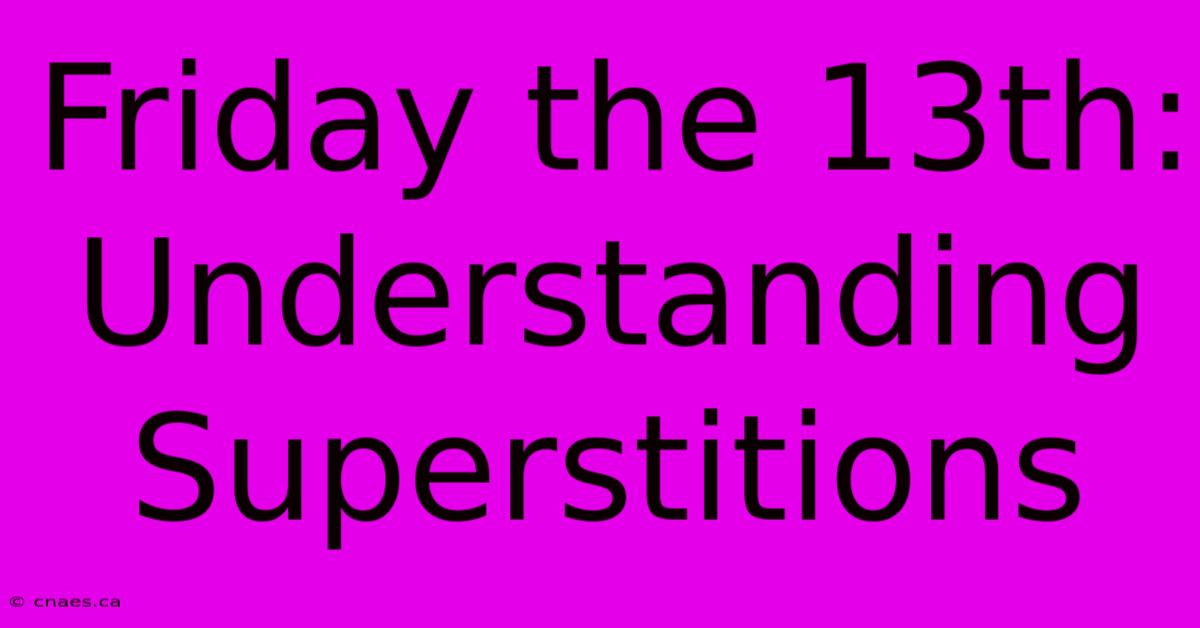Friday The 13th: Understanding Superstitions

Discover more detailed and exciting information on our website. Click the link below to start your adventure: Visit My Website. Don't miss out!
Table of Contents
Friday the 13th: Understanding Superstitions
Friday the 13th. Just the phrase conjures images of black cats, broken mirrors, and unfortunate events. But where does this pervasive superstition originate? This article delves into the history and psychology behind this enduring fear, offering insights into why so many people feel uneasy on this particular day.
The Roots of the Fear: A Trip Through History
The fear of Friday the 13th, or friggatriskaidekaphobia, isn't a modern invention. Its origins are complex and interwoven with various cultural beliefs and historical events.
Number 13: A Historically Unlucky Number?
The number 13 has long held negative connotations in many cultures. Some point to the Last Supper, where 13 individuals were present before the betrayal and crucifixion of Jesus. Others cite Norse mythology, where 12 gods were gathered at a feast when a 13th guest, Loki, arrived and caused the death of Balder, the god of light. Regardless of the specific origin, the association of 13 with misfortune has persisted for centuries.
Friday: A Day of Ill Omen?
Friday's association with bad luck also predates the modern era. In Christianity, Friday is associated with the crucifixion of Jesus. Furthermore, in some cultures, Friday itself was already considered an unlucky day, potentially due to its placement at the end of the work week, or perhaps due to other, less documented historical reasons.
The Psychology Behind Friggatriskaidekaphobia
Understanding the fear of Friday the 13th isn't solely about historical context. Psychology plays a significant role.
Confirmation Bias: Seeking Out the Negative
Confirmation bias is our tendency to notice and remember information that confirms our existing beliefs. If someone believes Friday the 13th is unlucky, they're more likely to notice and recall negative events that occur on that day, reinforcing their belief.
The Power of Suggestion: The Self-Fulfilling Prophecy
The widespread belief in the superstition can create a self-fulfilling prophecy. If people are anticipating bad luck, they might be more anxious and cautious, potentially leading to more accidents or mistakes. This reinforces the belief that Friday the 13th is indeed unlucky.
Overcoming the Fear: Rational Thinking and Mindfulness
While the fear of Friday the 13th might seem deeply ingrained, it's important to remember that it's an irrational fear.
Challenge Your Beliefs: Is it Really Different?
Consciously challenge your beliefs. Are accidents and misfortunes truly more frequent on Friday the 13th than on other days? Statistical evidence suggests otherwise.
Mindfulness and Rationality: Focus on the Present
Practice mindfulness techniques to stay grounded in the present moment. Don't let anxieties about the future overshadow your day. Focus on what you can control and let go of what you can't.
Friday the 13th: A Cultural Phenomenon
Ultimately, the fear of Friday the 13th is a fascinating blend of history, psychology, and cultural beliefs. While the superstition itself may lack a concrete basis in reality, its enduring presence serves as a reminder of the power of collective belief and the human tendency to seek patterns, even where none exist. Understanding the origins and psychological underpinnings of this fear can help us to approach it with a more rational and less anxious perspective. So, the next time Friday the 13th rolls around, remember the history, acknowledge the psychology, and choose to focus on the positive aspects of your day.

Thank you for visiting our website wich cover about Friday The 13th: Understanding Superstitions. We hope the information provided has been useful to you. Feel free to contact us if you have any questions or need further assistance. See you next time and dont miss to bookmark.
Also read the following articles
| Article Title | Date |
|---|---|
| New Ajax Board Chair Candidate | Dec 13, 2024 |
| Rangers Vs Tottenham Score And Match Report | Dec 13, 2024 |
| Crowd Crush Allu Arjuns Arrest | Dec 13, 2024 |
| Behind Friday The 13th 7 Myths | Dec 13, 2024 |
| Rangers Played Tottenham Europa | Dec 13, 2024 |
